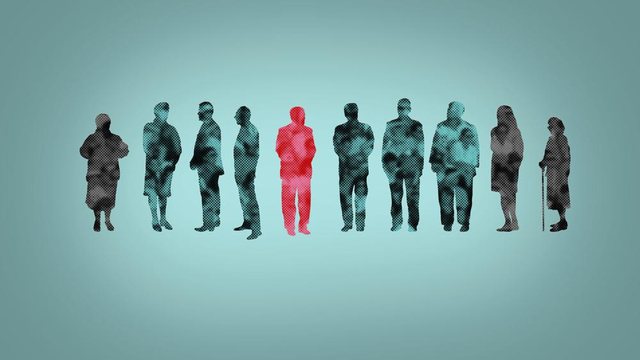
 Flash News
Flash News

Does Omicron bring us closer to herd immunity against COVID-19? Experts say it is unlikely that the highly transmissible variant, or any other variant, will lead to herd immunity.
"Clutch immunity is an elusive concept and does not apply to the coronavirus," says Dr. Don Milton at the University of Maryland School of Public Health.
Herd immunity is when a large number of the population is immune to a virus that it is difficult for the germ to spread to those who are not protected by vaccination or a previous infection.
For example, herd immunity to measles requires about 95% of a community to be immune. Early hopes for herd immunity against the coronavirus were dashed for several reasons.
One is that antibodies developed from available vaccines or previous infections diminish over time.
While vaccines offer strong protection against serious diseases, declining antibodies mean it is still possible to become infected.
Then there is a big difference in vaccines. In some low-income countries, less than 5% of the population is vaccinated. Rich countries are struggling with vaccine reluctance. And young children are still not eligible in many countries.
As the virus spreads, it changes - helping the virus survive and creating new variants. These mutants - such as omicron - can do better in avoiding the protection that humans have from vaccines or an early infection.
Populations are moving toward "herd resistance," where infections will continue, but people have enough protection so that future points are not so devastating to society, Milton says.
Many scientists believe that COVID-19 will eventually become like the flu and cause seasonal outbreaks, but not large increases.
Source: AP
Latest news




Bomb alert in a hotel in Tirana, what the police discovered
2025-05-30 22:05:17
The myth of 'eight hours of sleep' is debunked, here's what you need to consider
2025-05-30 22:01:55

For 7 million Lek maintenance pension, the bailiff seizes his house
2025-05-30 21:42:00



Video/ Bomb alarm in the parking lot of a hotel in Tirana, the police react
2025-05-30 20:59:35
Shots fired in Durres, one injured
2025-05-30 20:50:12
Bomb alert in the parking lot of a hotel in Tirana!
2025-05-30 20:25:46



"You know who buys votes", DP official publishes video: A witness ready for SPAK
2025-05-30 19:35:50

Kurti meets with members of the US Congressional staff
2025-05-30 18:59:14
The car is engulfed in flames on the Tirana-Durrës highway, what is suspected
2025-05-30 18:44:32







May 11/ "Bulgarian train" in Peqin, Celibashi responds to the DP
2025-05-30 16:39:25
He injured his compatriot in Podgorica, the young Albanian is arrested
2025-05-30 16:30:58
May 11th Elections, Mediu: The Electoral System Was Unacceptable
2025-05-30 16:15:04
Accident in Italy, two young Albanians lose their lives
2025-05-30 16:01:05
Get ready for the beach, high temperatures are expected on weekends
2025-05-30 15:49:07


Putin ignores Trump's warnings/Russia attacks Ukraine again with drones
2025-05-30 15:10:53

Macron: France may toughen stance on Israel if Gaza aid blockade continues
2025-05-30 14:41:14
Topalli ironizes the result in Fier: Albania in the 'club of autocrats'
2025-05-30 14:29:19
Bebe Rexha tops Billboard's list of the most streamed songs of the century
2025-05-30 14:14:52
40-year-old man injured in a chrome mine in Bulqiza
2025-05-30 13:59:30
KAS reviews DP's request for the invalidity of the elections in Dibër District
2025-05-30 13:48:08
Applications open for the "Teachers for Albania" 2025 program
2025-05-30 13:30:59

DP demands repeat elections for Kukës, KAS postpones review of appeal
2025-05-30 13:04:58

DP candidates demand recount/ Berisha: We are not blocking anyone
2025-05-30 12:41:08
Accused by Russia of supplying weapons to Ukraine, Serbia warns of investigation
2025-05-30 12:33:13

Official/ Massimiliano Allegri is the new coach of Milan
2025-05-30 12:18:45

Former CIA chief reveals the European country Putin will attack next
2025-05-30 12:01:06
"We are a hybrid dictatorship", Goxhaj: PS is a cover for crime and power
2025-05-30 12:00:51
The hearing in the Special Court for the "Metamorphosis" file is postponed again
2025-05-30 11:39:05
Haxhiu: Albania facing a demographic catastrophe
2025-05-30 11:33:39
Child poisoning in Gramsh, AKU: Caused by eggs contaminated with salmonella
2025-05-30 11:19:54
1000 cannabis seedlings in Libofshë, Fier, cultivator arrested
2025-05-30 11:10:12

TENT network, Albania is stuck in the millions allocated for infrastructure
2025-05-30 10:42:42
Vučić accuses the West of "being silent about the events in Kosovo"
2025-05-30 10:32:37
Five early signs that indicate you suffer from high blood pressure
2025-05-30 10:21:42

Young man fatally crashes into elderly man with car in Divjaka
2025-05-30 09:58:19

Germans save a lot, but why?
2025-05-30 09:30:13
What are the two most downloaded applications by Albanians during May 2025?
2025-05-30 09:18:28

Foreign exchange, May 30, 2025
2025-05-30 08:58:00
Si ta dalloni një narcisist që në takimin e parë edhe pa shkëmbyer asnjë fjalë?
2025-05-30 08:48:04
Ilir Alimehmeti appeals to the KAS the results of the elections in Tirana
2025-05-30 08:38:15

Horoscope, star forecast for today
2025-05-30 08:08:45
Sunny and partly cloudy, temperatures reaching up to 29 degrees during the day
2025-05-30 07:56:04
Morning Post/ In 2 lines: What mattered yesterday in Albania
2025-05-30 07:45:56
How will we escape the regime? Lubonja: Berisha is no longer to blame
2025-05-29 22:57:17



BIRN: Billions missing in economic growth
2025-05-29 22:14:22

Judge's brother bribed prosecutor, worked with gangs, and returned to work
2025-05-29 21:40:15
From Shijak to Lushnje, Berisha shows the armed gangs that helped the SP
2025-05-29 21:29:19


Berisha: Why did Rama hand over the Port of Durres to the Troplini cartel?
2025-05-29 21:08:01
Bylykbashi: This electoral system should have disappeared in 2020, it's not 2008
2025-05-29 20:47:04

KAS decides to open a box in a VC in Vlora
2025-05-29 20:36:19
Vokshi from the CDI Assembly: Europe must react to the electoral farce of May 11
2025-05-29 20:21:22


4 cars collide in Fier, two people injured
2025-05-29 19:10:12

Lawyer shocked: A sniper was paid by Albania to eliminate Prime Minister Kurti
2025-05-29 18:53:46



Netanyahu accepts US Gaza ceasefire plan, Hamas 'disappointed'
2025-05-29 17:53:48


